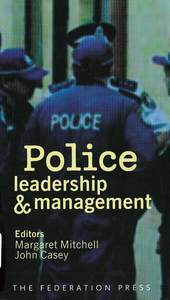Policing in Indigenous communities
Cunneen, Chris (2007) Policing in Indigenous communities. In: Mitchell, Margaret, and Casey, John, (eds.) Police Leadership and Management. Federation Press, Sydney, NSW, Australia, pp. 231-243.
![[img]](https://researchonline.jcu.edu.au/15457/1.hassmallThumbnailVersion/15457_Cunneen_Book_Cover.jpg)
|
Image (JPEG) (Book Cover)
- Cover Image
Download (257kB) |
|
|
PDF (Published Version)
- Published Version
Restricted to Repository staff only |
||
|
PDF (References)
- Supplemental Material
Download (7MB) |
Abstract
Policing in Indigenous communities is a vast topic to summarise, analyse and discuss in a few thousand words. It is an important issue on any range of measures. It is also an issue that demands attention to a range of broad political, socio-economic, cultural and historical contexts, as well as the more mundane matters of police operational concern. The political context requires us to understand the parameters in which Indigenous communities operate including the nature of Indigenous political demands and the key organisations that articulate those demands. The socio-economic context requires us to have knowledge about the position of Indigenous people in Australian society, in particular the consequences which arise from the profound level of disadvantage which many communities face and the impact that has on the relationship with the criminal justice system. The cultural context requires some knowledge about the nature of social relationships and cultural concerns in communities. Finally, the historical context is probably more important for police than any other government organisation delivering a service in Aboriginal communities, because police were an important arm in implementing government policy for Indigenous people in many parts of Australia during the much of the twentieth century.
Given the complexity of the topic, this chapter will be selective and, from necessity, concentrate relatively briefly on a few key themes. They include an analysis of the background to the contemporary relationship between police and Indigenous people; a discussion of some of the key drivers for reform including the Royal Commission into Aboriginal Deaths in Custody and more recently Aboriginal Justice Advisory Councils and the development of Aboriginal Justice Agreements; and a discussion of some of the key policing approaches specific to Indigenous communities such as Aboriginal liaison officers and Aboriginal community police.
| Item ID: | 15457 |
|---|---|
| Item Type: | Book Chapter (Research - B1) |
| ISBN: | 978-1-86287-649-1 |
| Date Deposited: | 11 Aug 2011 02:47 |
| FoR Codes: | 16 STUDIES IN HUMAN SOCIETY > 1602 Criminology > 160205 Police Administration, Procedures and Practice @ 50% 18 LAW AND LEGAL STUDIES > 1801 Law > 180101 Aboriginal and Torres Strait Islander Law @ 30% 16 STUDIES IN HUMAN SOCIETY > 1605 Policy and Administration > 160501 Aboriginal and Torres Strait Islander Policy @ 20% |
| SEO Codes: | 94 LAW, POLITICS AND COMMUNITY SERVICES > 9499 Other Law, Politics and Community Services > 949999 Law, Politics and Community Services not elsewhere classified @ 20% 94 LAW, POLITICS AND COMMUNITY SERVICES > 9404 Justice and the Law > 940404 Law Enforcement @ 80% |
| Downloads: |
Total: 2515 Last 12 Months: 48 |
| More Statistics |



